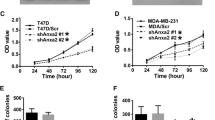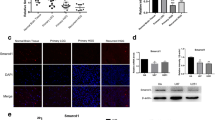Summary
The effect of siRNA-mediated Sox4 gene silencing on Wnt/β-catenin signaling pathway of human malignant melanoma cell line A375 was investigated. Two types of dsRNA targeting Sox4 were constructed and transfected into A375 cells, and untreated cells and cells transfected with scramble RNA were used as blank control and negative control respectively. The expression levels of mRNA and protein of Sox4, Wnt3a, β-catenin and Wnt/β-catenin signaling target gene Survivin were detected after real-time PCR and Western blot respectively. MTT assay was used to measure cell proliferation after Sox4 knockdown. β-catenin/TCF transcription reporter assay was used for assessing Wnt/β-catenin signaling pathway activity. Our results showed that the two types of Sox4 siRNA were transfected into A375 cells successfully. As compared with untreated cells, Sox4 siRNAs had no significant influence on Wnt3a expression, and Sox4 siRNAs led to the decrease of β-catenin at protein level. Wnt/β-catenin signaling pathway activity was inhibited significantly. As a target of Wnt/β-catenin signaling, Survivin was decreased at both mRNA and protein levels, and cell proliferation was attenuated. Our study suggests that Sox4 may play an important role in Wnt/β-catenin signaling pathway in human malignant melanoma cells by regulating β-catenin protein level, indicating that Sox4 is involved in the progression of malignant melanoma through Wnt/β-catenin signaling pathway.
Similar content being viewed by others
References
Thein DC, Thalhammer JM, Hartwig AC, et al. The closely related transcription factors Sox4 and Sox11 function as survival factors during spinal cord development. J Neurochem, 2010,115(1):131–141
Ying Y, Tao Q. Epigenetic disruption of the WNT/beta-catenin signaling pathway in human cancers. Epigenetics, 2009,4(5):307–312
Gehrke I, Gandhirajan RK, Kreuzer KA. Targeting the WNT/beta-catenin/TCF/LEF1 axis in solid and haematologicalcancers: Multiplicity of therapeutic Options. Eur J Cancer, 2009,45(16):2759–2767
Sinner D, Kordich JJ, Spence JR,et al. Sox17 and Sox4 differentially regulate β-catenin/T-cell factor activity and proliferation of colon cancer cells. Mol Cell Biol, 2007, 7(22):7802–7815
Pramoonjago P, Baras AS, Moskaluk CA. Knockdown of Sox4 expression by RNAi induces apoptosis in ACC3 cells. Oncogene, 2006,25(41):5626–5639
Larue L, Luciani F, Kumasaka M, et al. Bypassing melanocyte senescence by beta-catenin: a novel way to promote melanoma. Pathol Biol, 2009,57(7–8):543–547
Jafarnejad SM, Wani AA, Martinka M, et al. Prognostic significance of Sox4 expression in human cutaneous melanoma and its role in cell migration and invasion. Am J Pathol, 2010,177(6):2741–2752
Gould Rothberg BE, Berger AJ. Melanoma prognostic model using tissue microarrays and genetic algorithms. J Clin Oncol, 2009,27(34):5772–5780
O’Connell MP, Weeraratna AT, Jafarnejad SM, et al. Hear the Wnt Ror: how melanoma cells adjust to changes in Wnt. Pigment Cell Melanoma Res, 2009,22(6):724–739
Nemeth MJ, Topol L, Anderson SM, et al. Wnt5a inhibits canonical Wnt signaling in hematopoietic stem cells and enhances repopulation. Proc Natl Acad Sci, 2007,104(39): 15436–15441
Shimizu H, Julius MA, Giarré M, et al. Transformation by Wnt family proteins correlates with regulation of beta-catenin. Cell Growth Differ, 1997,8(12):1349–1358
Moreno CS. The Sex-determining region Y-box 4 and homeobox C6 transcriptional networks in prostate cancer progression: crosstalk with the Wnt, Notch, and PI3K Pathways. Am J Pathol, 2010,176(2):518–527
Penzo-Méndez AI. Critical roles for SoxC transcription factors in development and cancer. Int J Biochem Cell Biol, 2010,42(3):425–428
Li Z, Kustikova OS, Kamino K, et al. Insertional mutagenesis by replication-deficient retroviral vectors encoding the large T oncogene. Ann N Y Acad Sci, 2007,1106:95–113
Reichling T, Goss KH, Carson DJ. Transcriptional profiles of intestinal tumors in Apc (Min) mice are unique from those of embryonic intestine and identify novel gene targets dysregulated in human colorectal tumors. Cancer Res, 2005,65(1):166–176
Frierson HF Jr, El-Naggar AK, Welsh JB. Large scale molecular analysis identifies genes with altered expression in salivary adenoid cystic cancer. Am J Pathol, 2002,161(4):1315–1323
Altieri DC. Survivin and IAP proteins in cell-death mechanisms. Biochem J, 2010,430(2):199–205
Eustace AJ, Mahgoub T, Tryfonopoulos D, et al. Prospects for non-immunological molecular therapeutics in melanoma. J BUON, 2010,15(1):9–18
Liao Y, Zeng H, Wang X, et al. Expression patterns and prognostic significance of inhibitor of apoptosis proteins in adenoid cystic cancer and pleomorphic adenoma of lachrymal gland. Exp Eye Res, 2009,88(1):4–11
Lee CJ, Appleby VJ, Orme AT, et al. Differential expression of Sox4 and SOX11 in Medulloblastoma. J Neurooncol, 2002,57(3):201–214
Author information
Authors and Affiliations
Corresponding author
Additional information
This project was supported by a grant from National Natural Sciences Foundation of China (No. 81000704).
Rights and permissions
About this article
Cite this article
Cai, H., Ni, A., Li, W. et al. Inhibition of melanoma cell proliferation by targeting Wnt/β-catenin pathway through Sox4 RNA interference. J. Huazhong Univ. Sci. Technol. [Med. Sci.] 31, 565–569 (2011). https://doi.org/10.1007/s11596-011-0491-3
Received:
Published:
Issue Date:
DOI: https://doi.org/10.1007/s11596-011-0491-3




